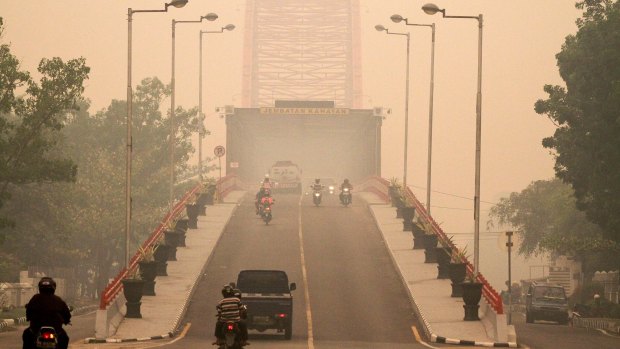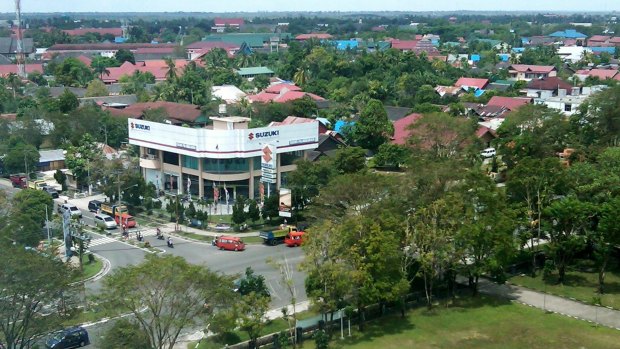This was published 7 years ago
Indonesia's capital Jakarta is so congested, government might move it to Borneo
By Jewel Topsfield and Karuni Rompies
Jakarta: Few people outside of Indonesia would have heard of Palangkaraya.
The city on the island of Borneo is a flyspeck by Indonesian standards - in 2014 it had a population of just 250,000.

Palangkaraya is home to only 250,000 people comapred with Greater Jakarta's 30 million.Credit: Yohanes Kurnia Irawan
Most of its land area is still covered by jungle and TripAdvisor recommendations include boat tours, prayer hills and opportunities to see orangutans.
But Palangkaraya holds a special place in the psyche of Indonesians - in 1957 President Sukarno, the nation's founding father, first floated the idea of moving the capital here. It is believed Sukarno's motive was at least in part symbolic. Jakarta, previously known as Batavia, had been the capital chosen by the Dutch and Sukarno was keen to sever ties with the country's colonial past.

Palangkaraya in Borneo has often been proposed as an alternative capital city to Jakarta.Credit: Yohanes Kurnia Irawan
But now the reason for moving capital cities is more pragmatic.
Every few years or so Palangkaraya is mooted as a replacement for the flood-prone, congested and dysfunctional capital that is Jakarta.
Now President Joko Widodo has asked the National Development Planning Agency (Bappenas) to carry out a feasibility study on relocating the capital city.
"It is not automatically Palangkaraya, but we will look at several alternatives and also set some criteria," said Bappenas chief Bambang Brodjonegoro.

Cars, buses and motorcycles sit in congested traffic in the business district in Jakarta.Credit: Dimas Ardian
"We want economic growth to spread. What is obvious, if we move one day, it will definitely be outside Java. This is definite. It is not possible that the centre of government will be on Java island."
Java, the island on which Jakarta is located, has about 60 per cent of Indonesia's population of roughly 250 million, while making up just seven per cent of its territory.

Most of Palangkaraya, Borneo, is jungle with boat tours, prayer hills and opportunities to see orangutans.Credit: Yohanes Kurnia Irawan
Jakarta is literally sinking. The megalopolis is already 40 per cent below sea level and sinking at between three and 20 centimetres a year due to groundwater extraction.
Greater Jakarta has a population of 30 million. Limited public transport and millions of commuters from satellite cities has led to teeth-grinding gridlock.

A mother orangutan and her little offspring in Borneo.Credit: Nikpal
The concrete jungle and rubbish-clogged waterways mean Jakarta floods every time there is torrential rain. The great flood of 2007 killed 80 people, displaced 500,000 and led to an outbreak of dengue fever.
It was also the instigator of Visi Indonesia 2033, a non-government organisation set up to formulate a vision for Indonesia in 2033, which includes moving the capital city.

President Joko Widodo has asked for a feasibility study on relocating Indoensia's capital to Palangkaraya in Borneo.Credit: Yohanes Kurnia Irawan
"We sat together and thought we should make a plan to avoid big floods happening again and to overcome various problems in Jakarta such as traffic congestion, social issues," said Bandung Institute of Technology lecturer Jehansyah Siregar.
He said Visi 2033 identified Kalimantan as a suitable location because it was in the middle of Indonesia, not affected by the earthquakes that rattle Java and safe from potential enemy attack.

Jakarta's Deputy Governor Djarot Saiful Hidayat is sceptical about moving the capital to Palangkaraya, pictured.Credit: Yohanes Kurnia Irawan
In 2010 former president Susilo Bambang Yudhoyono commissioned his staff to assess moving the capital.
"But after the SBY Administration is over, the idea is gone again," Mr Jehansyah said. "However as activists we keep echoing the idea, that this is important."
He welcomed the latest study but hoped it did not replicate previous analyses and went beyond listing other world capitals that had been successfully moved.
"Palangkaraya is one of the few cities in Indonesia established for a specific purpose, much in the same way that Canberra and Ottawa were chosen," Jakarta Globe columnist Johannes Nugroho wrote in 2015, after Sukarno's daughter, Megawati Sukarnoputri - also a former president - spruiked the advantages of moving there.
"[But] almost 60 years on, how practical would it be to relocate the capital to Central Kalimantan, a region whose infrastructure, both in terms of quantity and quality, is decades behind Jakarta's?"
"Most of our officials and public servants in Jakarta reside in Java. Would they be expected to live permanently in Central Kalimantan?"
Jakarta's Deputy Governor Djarot Saiful Hidayat was also sceptical. "It's been [discussed] for a long time right, but it doesn't make sense does it?," he was quoted as saying in Tempo.
"Imagine, you must also relocate embassies, relocate research institutions."
Anies Baswedan and Sandiaga Uno, who are narrow favourites to be elected Jakarta's next governor and deputy governor on April 19, did not have a formal position on the relocation.
However campaign spokesman Anggawirra, who uses only one name, told Fairfax Media the team had discussed it informally and basically supported the idea, given Jakarta was only designed for five to six million people.
He said development had been "too Java-centric" and relocating the capital to another island would stimulate new economic centres.
"However the government must do a very careful and comprehensive study about it," Mr Anggawirra said.
Presidential spokesman Johan Budi said the President had asked for a feasibility study.
"Whether or not we are ready [today], well we are not," he said. "We need to talk about it with the Parliament and other parties as well. However this topic has been discussed."